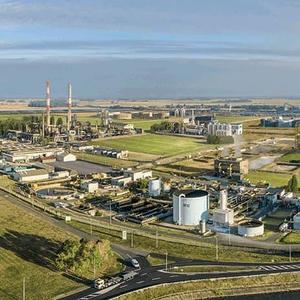TotalEnergies commits to increase production of SAF

SOURCE: TotalEnergies
June 19, 2023
BY TotalEnergies
TotalEnergies is actively responding to a call from its aviation customers to increase production of sustainable aviation fuel (SAF). As from 2028, the company will be in a position to produce half a million tons of SAF, enough to cover the gradual increase in the European SAF blending mandate, set at 6 percent for 2030.
To this end, TotalEnergies is investing massively and has launched multiple SAF production projects. These include:
•Grandpuits – TotalEnergies is investing €400 million to convert the site into a zero-crude platform, primarily focused on producing SAF from circular feedstock such as animal fat and used cooking oil. Grandpuits will be able to produce 210,000 tons/y of SAF as of 2025, and a new investment has been announced to produce a further 75,000 tons/y by 2027.
Advertisement
Advertisement
•Normandy – TotalEnergies has started coprocessing SAF from used cooking oil at its Gonfreville refinery. The Company plans to increase annual production at the site to 40,000 tons from 2025. In addition, following technical work carried out with its aeronautical partners, TotalEnergies will produce an additional 150,000 tons/y of SAF by coprocessing HVO biodiesel produced at La Mède as soon as this production method is approved by the ASTM*.
•La Mède – TotalEnergies has invested €340 million to convert its refinery into a biorefinery. Biodiesel produced at La Mède is already being used to make SAF at the TotalEnergies Oudalle plant near Le Havre. TotalEnergies is studying a new investment to have the capacity to process at La Mède, by 2024, 100 percent waste from the circular economy (used cooking oil and animal fat) to produce biofuels and SAF by coprocessing.
Beyond France, TotalEnergies aims to produce 1.5 million tons/y of SAF by 2030 at production units in Europe, the United States, Japan and South Korea, representing 10 perceent of the world market by that date.
"TotalEnergies is taking action to meet the strong demand from the aviation industry to reduce its carbon footprint. Sustainable aviation fuel is essential to reducing the CO2 emissions of air transport, and its development is fully aligned with the Company's climate ambition to get to net zero by 2050, together with society," said Patrick Pouyanné, chairman and CEO of TotalEnergies.
Advertisement
Advertisement
* ASTM International drafts and produces technical standards for materials, products, systems and services.
Related Stories
The U.S. Energy Information Administration maintained its forecast for 2025 and 2026 biodiesel, renewable diesel and sustainable aviation fuel (SAF) production in its latest Short-Term Energy Outlook, released July 8.
XCF Global Inc. on July 10 shared its strategic plan to invest close to $1 billion in developing a network of SAF production facilities, expanding its U.S. footprint, and advancing its international growth strategy.
U.S. fuel ethanol capacity fell slightly in April, while biodiesel and renewable diesel capacity held steady, according to data released by the U.S. EIA on June 30. Feedstock consumption was down when compared to the previous month.
XCF Global Inc. on July 8 provided a production update on its flagship New Rise Reno facility, underscoring that the plant has successfully produced SAF, renewable diesel, and renewable naphtha during its initial ramp-up.
The USDA’s Risk Management Agency is implementing multiple changes to the Camelina pilot insurance program for the 2026 and succeeding crop years. The changes will expand coverage options and provide greater flexibility for producers.
Upcoming Events










